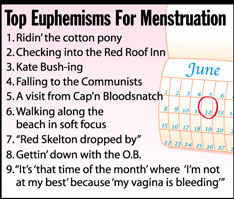- Men would brag about how long and how
much.
- Boys would mark the onset of menses, that
longed-for proof of manhood, with religious ritual and stag parties.
- The US Congress would fund a National
Institute of Dysmenorrhea to help stamp out monthly discomforts.
- Sanitary supplies would be federally funded
and free. (Of course, some men would still pay for the prestige
of commercial brands such as John Wayne Tampons, Muhammed Ali's
Rope-a-dope Pads, Joe Namath Jock Shields--"For Those Light
Bachelor Days," and Robert "Baretta" Blake Maxi-Pads.)
- Military men, right-wing politicians,
and religious fundamentalists would cite menstruation ("MENstruation")
as proof that only men could serve in the army ("You have
to give blood to take blood"), occupy political office ("Can
women be aggressive without that steadfast cycle governed by the
planet Mars?"), be priests and ministers ("how could
a woman give her blood for our sins"), or rabbis ("Without
the monthly loss of impurities, women remain unclean").
- Male radicals, left-wing politicians,
and mystics, however, would insist that women are equal, just
different; and that any woman could enter their ranks if only
she were willing to self-inflict a major wound every month ("You
MUST give blood for the revolution"), recognize the preeminence
of menstrual issues, or subordinate her selfness to all men in
their Cycle of Enlightenment.
- Street guys would brag ("I'm a three-pad
man") or answer praise from a buddy ("Man, you are
lookin' good") by giving fives and saying, Yeah, man, I'm
on the rag!"
- TV shows would treat the subject at length.
* "Happy Days": Richie and Potsie try to convince Fonzie
that he is still "The Fonz," though he has missed two
periods in a row. * So would newspapers. (JUDGE CITES MONTHLY
STRESS IN PARDONING RAPIST.) * And movies. (Newman and Redford
in "Blood Brothers"!)
- Men would convince women that intercourse
was more pleasurable at "that time of the month." Lesbians
would be said to fear blood and therefore life itself--though
probably only because they needed a good menstruating man.
- Of course, male intellectuals would offer the most moral and logical arguments. How could a woman master any discipline that demanded a sense of time, space, mathematics, or measurement, for instance, without that in-built gift for measuring the cycles of the moon and planets--and thus for measuring anything at all? In the rarefied fields of philosophy and religion, could women compensate for missing the rhythm of the universe? Or for their lack of symbolic death-and-resurrection every month?
